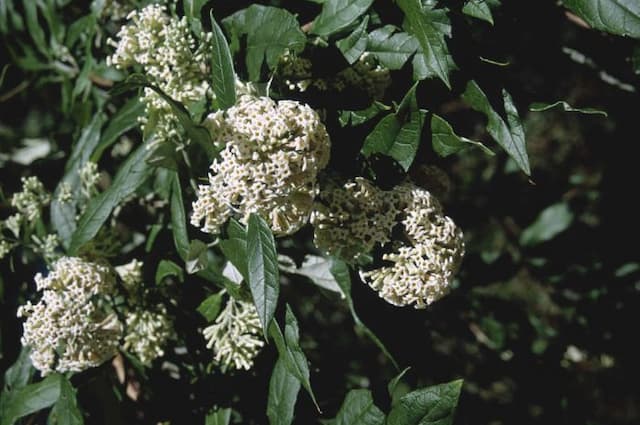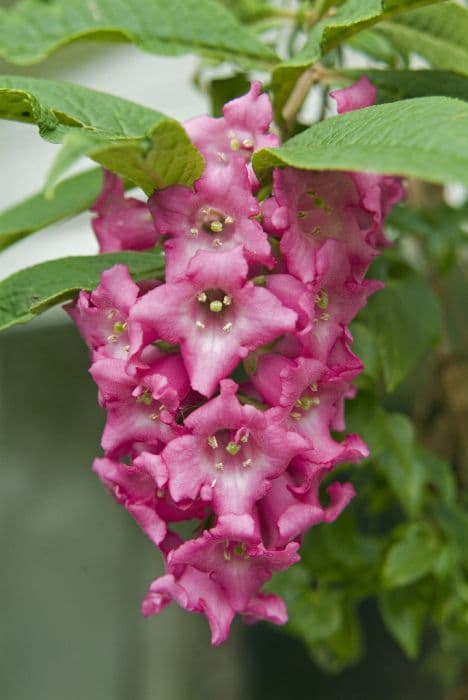Mullein Verbascum 'Pink Kisses'

ABOUT
Verbascum 'Pink Kisses' is characterized by its striking spikes of flowers, which display a lovely pink color with a softer, almost pastel hue. Each individual flower is accented with a darker pink or purple center, often with a hint of orange or yellow, which adds depth and contrast to the floral display. The petals are rounded, with delicate edges that can appear almost ruffled, contributing to the overall soft appearance of the blooms. The foliage of Pink Kisses is typically a rich, deep green and has a slightly fuzzy or velvety texture. The leaves are large and can be somewhat elongated or oval in shape, with edges that are either smooth or exhibit a gentle undulation. The contrast between the verdant leaves and the warm pink floral tones creates an alluring visual appeal. Though commonly seen within the garden setting, Pink Kisses makes a striking appearance and is often appreciated for its contribution to a cottage garden aesthetic or for adding a touch of old-fashioned charm to modern landscaping. The blooms are usually dense and abundant, ensuring a long-lasting and showy display that can catch the eye from a distance.
About this plant
 Names
NamesFamily
Scrophulariaceae
Synonyms
Mullein, Velvet Plant
Common names
Verbascum 'Pink Kisses'.
 Toxicity
ToxicityTo humans
The plant commonly known as Mullein, specifically Verbascum 'Pink Kisses', is not considered toxic to humans. It does not contain any known toxins that would cause poisoning if ingested. Therefore, there should be no symptoms of poisoning related to the consumption of parts of this plant. However, as with any plant material, individual allergies or sensitivities can cause adverse reactions, and it is generally not advisable to consume plants not established as food sources.
To pets
Mullein, the common name for Verbascum 'Pink Kisses', is not known to be toxic to pets. This plant is not listed among those that are poisonous to domestic animals such as dogs and cats. Consequently, ingestion of parts of this plant is unlikely to cause poisoning or serious health issues. However, non-toxic plants can still cause gastrointestinal upset if eaten in large quantities, so it is best to prevent pets from consuming plants that are not part of their typical diet.
 Characteristics
CharacteristicsLife cycle
Biennials
Foliage type
Deciduous
Color of leaves
Green
Flower color
Pink
Height
2 feet (0.61 meters)
Spread
1 foot (0.30 meters)
Plant type
Herb
Hardiness zones
5
Native area
Europe
Benefits
 General Benefits
General Benefits- Attractive Flowers: Adds aesthetic appeal with its pink blossoms.
- Drought-Tolerant: Requires less watering and adapts to dry conditions.
- Easy to Grow: Low maintenance and suitable for beginner gardeners.
- Long Blooming Period: Produces flowers for an extended period of time, often throughout the summer months.
- Attracts Wildlife: Draws in pollinators like bees and butterflies, beneficial for garden health and biodiversity.
- Height Interest: Adds vertical interest to gardens with its tall flower spikes.
- Sun-Loving: Thrives in full sunlight, making it ideal for sunny garden spots.
- Cottage Garden Appeal: Fits well in informal and cottage-style gardens.
- Multipurpose Use: Can be planted in borders, beds, and as a focal point in a garden design.
 Medical Properties
Medical PropertiesThis plant is not used for medical purposes.
 Air-purifying Qualities
Air-purifying QualitiesThis plant is not specifically known for air purifying qualities.
 Other Uses
Other Uses- Plant dye: Flowers of the mullein can be used to create a natural dye for coloring fabrics or yarn; the shade obtained often ranges from yellow to green.
- Photography: The tall stalks and vibrant blooms of mullein can serve as an attractive subject for nature photography, enhancing garden aesthetics.
- Fire starter: Dried mullein stalks can be used as a natural fire starter due to their flammability when dry, which makes them convenient for camping or outdoor activities.
- Natural insulation: The fluffy leaves and stalks can be processed to create a plant-based insulation material for small DIY projects.
- Decorative crafts: Dried mullein plants can be incorporated into floral arrangements or used to create decorative wreaths and other home décor items.
- Livestock feed: While not common, some farmers might use mullein as supplementary forage for livestock, although care must be taken due to its potential irritant properties.
- Sound insulation: The dense foliage can potentially be used in soundproofing applications in eco-friendly construction projects.
- Insect habitat: Allowing mullein to grow wild can provide shelter and food for beneficial insects, contributing to the biodiversity and health of garden ecosystems.
- Fish composting: Some gardeners may use mullein plants as part of a fish compost, known as "fish mulch," to enrich the soil as they decompose.
- Bird nesting material: The soft leaves and fibers of mullein could be used by birds as nesting material if left available in the environment.
Interesting Facts
 Feng Shui
Feng ShuiThe Mullein is not used in Feng Shui practice.
 Zodiac Sign Compitability
Zodiac Sign CompitabilityThe Mullein is not used in astrology practice.
 Plant Symbolism
Plant Symbolism- Healing: Verbascum, commonly known as Mullein, has been used in traditional medicine for centuries to treat various ailments, symbolizing health and recovery.
- Protection: In folklore, Mullein was believed to ward off evil spirits and bad luck, making it a symbol of safeguarding and spiritual defense.
- Love: The 'Pink Kisses' variety, with its soft pink flowers, could be seen as symbolizing gentle affection and the tender touch of a loved one.
- Purity: The simplicity and clarity of Mullein's blooms are often associated with innocence and cleanliness.
- Consolation: Due to its comforting properties in herbal remedies, Mullein can represent empathy and the act of easing someone's suffering.
 Water
WaterMullein 'Pink Kisses' should be watered deeply once a week, making sure to thoroughly soak the soil until water runs through the drainage holes of the pot. During the hot summer months, you might need to water twice a week, especially if the top inch of the soil feels dry to the touch. Reduce watering in the winter to every other week or less, as the plant is dormant and requires less moisture. Always check the soil moisture before watering to prevent overwatering. A general guideline is to provide approximately one gallon of water per plant during each watering session, adjusting as needed based on temperature and weather conditions.
 Light
LightMullein 'Pink Kisses' prefers full sun to partial shade, thriving best in a location that receives at least 6 hours of direct sunlight daily. An east or west-facing window is ideal for indoor plants, or a spot in the garden that gets sun in the morning but shade during the intense afternoon heat. Avoid deep shade, as too little light can hinder flowering and cause leggy growth.
 Temperature
TemperatureMullein 'Pink Kisses' can tolerate a temperature range from about 40°F to 85°F, but ideally, they should be kept in conditions between 60°F and 70°F. While they can handle occasional dips below freezing, prolonged exposure to temperatures below 40°F may harm the plant. Ensure protection from harsh frost and extreme heat above 85°F to maintain plant health and encourage blooming.
 Pruning
PruningMullein 'Pink Kisses' benefits from pruning to remove spent flower spikes and encourage a second flush of blooms. Prune immediately after the first bloom by cutting back the flower stalks to the base of the plant. Additionally, you may prune to shape the plant or remove any damaged or discolored leaves. The best time for pruning is late winter or early spring before the onset of new growth.
 Cleaning
CleaningAs needed
 Soil
SoilMullien 'Pink Kisses' thrives in well-draining soil with a mix of sand, loam, and compost. The ideal pH for this plant is between 6.0 and 7.5. An incorporation of some gravel or perlite can enhance drainage, which is critical for the health of these plants.
 Repotting
RepottingMullien 'Pink Kisses' typically doesn't need frequent repotting and can be done every 2 to 3 years. Repot in spring or early summer when the plant shows signs of being root-bound or the soil is depleted.
 Humidity & Misting
Humidity & MistingMullien 'Pink Kisses' is adaptable to a wide range of humidity levels but prefers moderate conditions. No specific humidity requirements are needed for this plant to thrive.
 Suitable locations
Suitable locationsIndoor
Place Mullien 'Pink Kisses' near a sunny window and ensure good air circulation.
Outdoor
Plant Mullien 'Pink Kisses' in sunny spot with well-drained soil.
Hardiness zone
5-9 USDA
 Life cycle
Life cycleThe life cycle of the Verbascum 'Pink Kisses', commonly known as Mullein, begins with seed germination, which requires a well-draining soil and can occur at a wide temperature range, but often they need light to germinate and perform best when sown on the soil surface. Following germination, the seedlings develop into a rosette of basal leaves during their first year, focusing on vegetative growth. In the second year, the Mullein produces a tall flowering stalk, which bears numerous pink flowers that are attractive to pollinators like bees and butterflies. After flowering, usually in the summer, seeds form and are dispersed by wind or gravity, completing the reproduction phase. The plant is biennial, meaning it typically lives for two years, dying after seed production. The cycle continues as new seeds germinate, ensuring the propagation of the Mullein population.
 Propogation
PropogationPropogation time
Spring-Early Summer
Propogation: Verbascum 'Pink Kisses', commonly known as mullein, is often propagated by sowing seeds. The best time to start this process is in late winter to early spring, indoors, about 6 to 8 weeks before the last expected frost. To propagate mullein by seeds, begin with a well-draining seed starting mix in a flat or container. Sprinkle the tiny seeds on the surface of the soil without covering them, as they need light to germinate. Keep the soil moist but not waterlogged, and place the container in a warm spot with plenty of indirect sunlight. Germination usually occurs within 2 to 3 weeks. Once seedlings have grown large enough to handle, they can be transplanted into individual pots and later moved to their final position in the garden after the danger of frost has passed.

![Butterfly bush [Berries and Cream]](/_next/image?url=https%3A%2F%2Fplants-admin.emdemapps.com%2Fimages%2Fplants%2F%2Fimages%2F604b650f667be.png&w=640&q=75)





![Butterfly bush [Nanho Purple]](/_next/image?url=https%3A%2F%2Fplants-admin.emdemapps.com%2Fimages%2Fplants%2F%2Fimages%2F604b5e3cb2c58.png&w=640&q=75)
